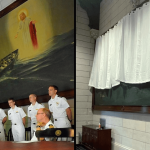This piece was originally published at The Christian Post on September 3, 2012.
The “Gospel” is often understood by Christians to mean “good news”. Now if the Gospel of Jesus Christ is taken to mean good news (See Mark 1:1), what’s so good about it? While one could offer many responses to this question, I will focus in this entry on just one. The Gospel of Jesus Christ is good news because it is his good news. It is bound up with Jesus’ identity and his mission. It is not the gospel (euaggelion) or good news of Caesar and the salvation he offers through his military conquests, but of Jesus through his conquest of death and decay through his life, crucifixion unto death, and resurrection to new life. Whereas Caesar often humiliated messianic figures and rebels through crucifixion, Messiah Jesus’ glory comes through the cross.
The Pax Romana or peace of Rome was forced on its subjects, whereas Jesus’ peace, the Pax Christi, is formed in us, as we are identified with him. We often seek to force life to fit our predetermined mode. We seek to bring peace and order to the chaos and violence of our world like Rome did—through greater violence. Christ brought about peace and order through the chaos of his own cross, as he suffered violence at the hands of Rome. No doubt this is one reason why the Romans under Nero and the like tried to stamp out Christianity. The Pax Christi’s growth and development would spell the death of Rome, as it elevated the weak and foolish by Greek and Roman standards and humbled the powerful and sophisticated, a point not lost on Paul (1 Corinthians 1:18-31), the Romans, or Nietzsche (“The Antichrist,” in The Portable Nietzsche, ed. Walter Kaufmann {New York: Viking Press, 1968}, 633–44), but often lost on us. Rome conquered by retribution, but Jesus by way of redemptive love.
I am not one known for militarism, but I am known to myself as being one who often ‘violently’ strives in the present to bring order to the chaos of my past and conquer the future. Falling to the temptation to ascend the ladder of my career at all cost wreaks havoc on my call to find my identity in relation to Christ and in caring for those around me. What will I achieve in the end if I pursue my career and miss this call? What will I get in the end—Roman columns deteriorating in the sun? I was humbled the other day as my kids woke up far earlier than they do on most mornings. I was working at my computer by 5 AM, bringing order to my cluttered thoughts as I banged away on the keyboard. My kids sat down at the table where I worked. My daughter broke my concentration when she said she wanted to go to school with me that day. I told her that the day would be filled with various meetings from morning to late afternoon, and added that the life of a professor is often not so exciting. She agreed and said my work was boring, going on in detail to talk about how I am always sitting, working on my computer. She then went on to say that she wished I had been a hot dog vendor because she could have all the hot dogs she could get day and night. My son chuckled. No doubt he wishes I had become a Navy Seal or an Army Ranger. I told them, half-humorously, that I had trained all those years to get to this point of being a professor and sitting down at this computer to work, and had missed my calling—I could have been a hot dog vendor (though probably not a very good one).
I had always thought my kids would respect me for the work I do. But will they? Could I, could we, go through life and miss it? We do violence to the world to get ahead, but where does it lead us in the end? Jesus got ahead by being who he was from the beginning. Before he does a single thing in public, he is called God’s beloved Son (See Mark 1:9-11). Everything flows out of his relationship with his Father in the Spirit (Mark 1:9-12). We are often trying to get ahead as we force our will on our surroundings, not unlike Rome. But what is left to us in the end—a few columns fading away, a few books collecting dust and moths on the shelf? Sure, Rome has left its mark on our world through such things as its legal and political prowess. One cannot question its greatness. But Jesus is greater still.
Jesus has left his mark on our world through his character that flows out of his communion with his Father in the Spirit. Before he performed one mighty deed in public, he had already won. He did not need to forge his identity by forcing his will on his surroundings. The authority of his call to repentance flowed from who he was and is, as the king whose kingdom is at hand (Mark 1:14-15). Like John the Baptist, I am not worthy to untie the straps on his sandals (Mark 1:7). Nor is Caesar, for that matter. Repentance is our only rightful response to him, for his kingdom is at hand. It is a kingdom of peace and righteousness that flows from who he is. Just think who we can be and not simply do, as we repent of our violent ambition and live into and out of our communion with him.
The Gospel is such good news because it flows from Jesus’ just and peaceful and humble and pure and loving character that forever flows out toward us from his communion with his Father in the Spirit. John baptizes with water. Jesus baptizes with the Spirit (Mark 1:8). Rome conquers with violence. Jesus conquers with love. No matter how great our urge for violence is, I still believe our greatest urge is to love and be loved. No wonder, vendors and soldiers and professors old and new have often sought to align themselves with his call, even at the cost of suffering the violence of Rome old and new. The Gospel is good news because Jesus does not force his peace upon us, but forms it within us by love as we trust in him. May we cease striving to force our peace on our surroundings (for what will that get us in the end?), but live into God’s peace as his children, as Jesus forms his eternal life in us anew.
















